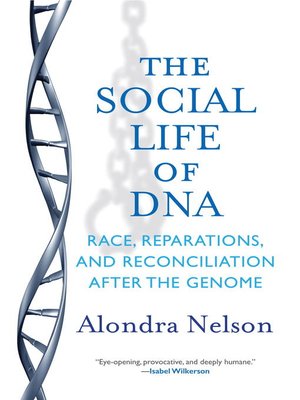The Social Life of DNA
ebook ∣ Race, Reparations, and Reconciliation After the Genome
By Alondra Nelson

Sign up to save your library
With an OverDrive account, you can save your favorite libraries for at-a-glance information about availability. Find out more about OverDrive accounts.
Find this title in Libby, the library reading app by OverDrive.



Search for a digital library with this title
Title found at these libraries:
| Library Name | Distance |
|---|---|
| Loading... |
The unexpected story of how genetic testing is affecting race in America
We know DNA is a master key that unlocks medical and forensic secrets, but its genealogical life is both revelatory and endlessly fascinating. Tracing genealogy is now the second-most popular hobby amongst Americans, as well as the second-most visited online category. This billion-dollar industry has spawned popular television shows, websites, and Internet communities, and a booming heritage tourism circuit.
The tsunami of interest in genetic ancestry tracing from the African American community has been especially overwhelming. In The Social Life of DNA, Alondra Nelson takes us on an unprecedented journey into how the double helix has wound its way into the heart of the most urgent contemporary social issues around race.
For over a decade, Nelson has deeply studied this phenomenon. Artfully weaving together keenly observed interactions with root-seekers alongside illuminating historical details and revealing personal narrative, she shows that genetic genealogy is a new tool for addressing old and enduring issues. In The Social Life of DNA, she explains how these cutting-edge DNA-based techniques are being used in myriad ways, including grappling with the unfinished business of slavery: to foster reconciliation, to establish ties with African ancestral homelands, to rethink and sometimes alter citizenship, and to make legal claims for slavery reparations specifically based on ancestry.
Nelson incisively shows that DNA is a portal to the past that yields insight for the present and future, shining a light on social traumas and historical injustices that still resonate today. Science can be a crucial ally to activism to spur social change and transform twenty-first-century racial politics. But Nelson warns her readers to be discerning: for the social repair we seek can’t be found in even the most sophisticated science. Engrossing and highly original, The Social Life of DNA is a must-read for anyone interested in race, science, history and how our reckoning with the past may help us to chart a more just course for tomorrow.
We know DNA is a master key that unlocks medical and forensic secrets, but its genealogical life is both revelatory and endlessly fascinating. Tracing genealogy is now the second-most popular hobby amongst Americans, as well as the second-most visited online category. This billion-dollar industry has spawned popular television shows, websites, and Internet communities, and a booming heritage tourism circuit.
The tsunami of interest in genetic ancestry tracing from the African American community has been especially overwhelming. In The Social Life of DNA, Alondra Nelson takes us on an unprecedented journey into how the double helix has wound its way into the heart of the most urgent contemporary social issues around race.
For over a decade, Nelson has deeply studied this phenomenon. Artfully weaving together keenly observed interactions with root-seekers alongside illuminating historical details and revealing personal narrative, she shows that genetic genealogy is a new tool for addressing old and enduring issues. In The Social Life of DNA, she explains how these cutting-edge DNA-based techniques are being used in myriad ways, including grappling with the unfinished business of slavery: to foster reconciliation, to establish ties with African ancestral homelands, to rethink and sometimes alter citizenship, and to make legal claims for slavery reparations specifically based on ancestry.
Nelson incisively shows that DNA is a portal to the past that yields insight for the present and future, shining a light on social traumas and historical injustices that still resonate today. Science can be a crucial ally to activism to spur social change and transform twenty-first-century racial politics. But Nelson warns her readers to be discerning: for the social repair we seek can’t be found in even the most sophisticated science. Engrossing and highly original, The Social Life of DNA is a must-read for anyone interested in race, science, history and how our reckoning with the past may help us to chart a more just course for tomorrow.







